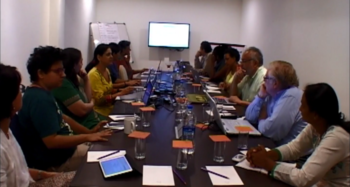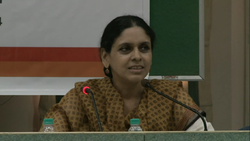Feminist Frameworks
From ITfC Annual Report 2014-15
As both a researcher and an activist, it is always a pleasure to work with IT For Change. Their research always challenges my own thinking and praxis, inviting new avenues for both research and collaboration. Their commitments in the field, combined with rigourous and human-centred analysis, invite the respect and admiration of those who work with them. I hope to continue finding new and exciting ways of learning from and working with the team at IT For Change in our common work of building a fairer future.
-Sonia Randhawa, Director, Centre for Independent Journalism, Malaysia/ Board Member, ISIS International Manila
Research
Women-gov (IDRC, Canada)
Women-gov, a two-year action-research project (2012-14), that had primarily focused on exploring digitally-enabled pathways for enhancing the substantive participation of marginalised women, in local governance processes, across three sites in the global South: Rio de Janeiro (Brazil), Mysore (India) and Cape Town (South Africa), came to a close in September 2014. IT for Change provided conceptual leadership to this project, and also spearheaded the India component of the action-research. The other partnering organisations were Instituto Nupef (Brazil) and University of the Western Cape (South Africa). The research reports from each site and the report of the research validation meeting can be accessed here. A policy brief that consolidates key insights from the 3 sites was produced by IT for Change, and can be accessed here.Films from the project sites on participant experiences can be accessed here.
ICTs for Empowerment of Women and Girls (World Wide Web Foundation and SIDA)
In mid-2014, the World Wide Web Foundation (WWW) in collaboration with SIDA launched 'ICTs for Empowerment of Women and Girls',a 12-month research and policy advocacy initiative with the vision of empowering women in and through the Internet, across ten countries in Africa, Asia and South America. The project seeks to deliver evidence-based research, facilitate policy dialogue and promote commitment and incorporation of action plans on women’s empowerment and ICT issues in ten countries.
Anita Gurumurthy, Executive Director, IT for Change is the Project Advisor. She has provided inputs to the background report of the study prepared by WWW Foundation, and she will be co-authoring the final research report of the study which will be published in September-October 2015. IT for Change is also leading the India component of the research.
E-government and gender equality in the Asia Pacific (UNESCAP)
The United Nations Economic and Social Commission for Asia and the Pacific (UNESCAP), in partnership with United Nations Project Office on Governance (UNPOG), is carrying out a research study across five countries in the Asia-Pacific (India, Philippines, Fiji, Republic of Korea, Australia) to glean key policy insights in the area of designing innovations in e-Government for promoting gender equality and women's empowerment. UNESCAP commissioned IT for Change in mid-2014, to lead this study by developing the research framework, conduct the India component of the field research, select and mentor country researchers across the other four sites in undertaking specific case studies on good practices in this area, and prepare the synthesis report of the key findings.
The country studies are in progress, and the synthesis report will be ready by September 2015. The overall research framework developed by IT for Change for this study can be accessed here.
Strengthening Information Society Research Capacity Alliance-III
In July 2015, IT for Change received a grant from the 'Strengthening Information Society Research Capacity Alliance -III', a joint initiative of IDRC and the Singapore Internet Research Centre, that aims at field-building in the area of 'Open Development', over 2015-16. IT for Change's project is on studying organisational flux, normative fluidity and power distribution in the network society, and their implications for theorising 'Open Development' – deepening our earlier contributions in field-building in this area.
Advocacy
How we engaged in stock-taking of BPfA+20 through IAMCR forums
In May 2015, Anita Gurumurthy participated in three sessions at the International Forum on Gender, Media, ICTs and Journalism: 20 years after the Beijing Platform for Action. The forum was organised by the International Association for Media and Communication Research (IAMCR) in collaboration with the Centre for Interdisciplinary Research in Humanities and Science (CIRHS) of the National Autonomous University of Mexico (UNAM) in May 2015. The International Forum reviewed the implementation of Section J of the Beijing Platform for Action (BPfA) and its critical areas – gender balance in media content, women in media structures, gender and media policy, gender and freedom of expression, gender and digital communication, and current challenges. At the event, she presented a regional report on Gender and Media in Asia over the last 20 years, a presentation on Gender policy for the Information Society and a framework for a Digital Agenda.
Global Alliance for Media and Gender
IT for Change was elected as a member of the International Steering Committee of the Global Alliance for Media and Gender (GAMAG), set up by UNESCO in mid-2014. The aim of GAMAG is to effectively leverage global advocacy spaces to promote gender equality, in and through, the media – one of the key priorities envisaged in BPfA. IT for Change has been active in the dialogues on this forum, and is part of the Research Sub-Committee of GAMAG.
Capacity-Building
During September 2014, in partnership with Kutch Mahila Vikas Sangathan (KMVS) and Area Networking and Development Initiatives (ANANDI), IT for Change organised a 3 day short course on 'Re-Wiring Women's Rights Debates in the Digital Age' in New Delhi, that aimed at introducing activists, NGO leaders as well as young researchers working in the areas of women's rights and social justice to critical concerns for democracy, accountable governance and gender justice in the digital age. Peer discussions among the participants was also part of the methodology, to identify critical concerns for democracy, accountable governance and gender justice in the emerging techno-mediated social context.
The course was extremely successful in opening up a conversation between practitioners engaged in women's rights issues, and internet rights researchers and activists.
Network-Building
Deepening connections with other rights-based struggles at the national level
2014-15 has been a critical period for IT for Change in terms of strengthening our linkages with other rights-based struggles at the national level. We have engaged with the MAKAAM alliance of women farmers and members of the Right to Food Campaign to explore ways of working together, in the area of utilising the digital opportunity for strengthening these struggles. Though the proposals that we submitted have not yet assumed a concrete shape on the ground, our dialogues and debates continue – and in fact, in late July 2015, MAKAAM invited us to help them develop their position paper on the new Farmers' portal and Kisan channel launched by the Government of India. Similarly, we are currently in the midst of a conversation with Mobile Creches, an active member of the Alliance for Right to Early Childhood Care and Development, to explore ways of jointly working on a demonstration project that creates an ICT-enabled model for strengthening anganwadis. We have also been engaging with the National Forum for Action on Convergence, a national level network of civil society organisations that are focused on the issue of designing and implementing convergent service delivery systems that are equitable and inclusive – and we shared insights them from our experience at the Prakriye field centre.
Another major network that we have engaged with has been the Mahila Rajsatta Andolan, that works on federating and strengthening elected women across Maharashtra – to share insights with them from the 'Making Women's Voices and Votes Count' project and explore opportunities for collaboration.
Engagement with global initiatives on bridging feminist and internet rights communities
IT for Change has been extremely active in global level civil society dialogues and discussions within and across, the communities of gender and sexuality activists, and Internet rights activists. In August 2014, IT for Change played a key role in ensuring that the 'Feminist Principles of the Internet' document produced by members of the APC network, adequately emphasised the principles of universal, affordable and equal access. A year later, IT for Change participated in the review meeting on the Feminist Principles of the Internet, convened by APC in July 2015 in Port Dickson, Malaysia.
In July 2015, Anita Gurumurthy contributed to the special GenderIT.org edition that commemorated the life and work of academic and activist Heike Jensen, that focused on examining the ways in which Jensen's legacy in the area of unpacking the field of Internet governance through a feminist lens, could be taken forward. In her reflections, Anita focussed on the critical need to strategically engineer gender issues into media and ICT policy debates, and avoid pasting them as add-ons – upon publication, this triggered an online conversation on the potential for resistance in the network society with scholar Claudia Lodia.


